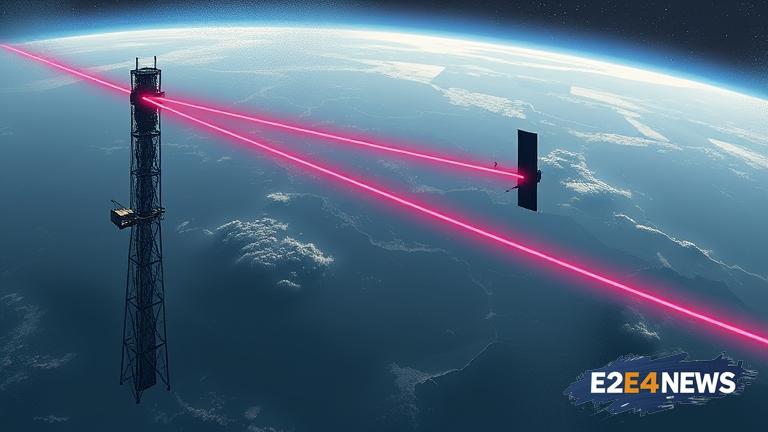A recent study published by a group of Chinese researchers has proposed the use of laser technology to disrupt satellite communications, raising concerns about the potential for space-based warfare. The researchers suggest that lasers could be used to interfere with satellite signals, potentially disrupting communications and navigation systems. This proposal has sparked debate about the ethics and implications of using laser technology in this way. The study highlights the growing importance of space-based technology and the need for countries to develop strategies to protect their assets in space. The use of lasers to disrupt satellite communications is not a new concept, but the Chinese researchers’ proposal has brought attention to the potential risks and benefits of this technology. The researchers argue that lasers could be used to disable or destroy enemy satellites, giving a country a significant advantage in space-based warfare. However, others have raised concerns about the potential for unintended consequences, such as disrupting civilian communications or causing damage to other satellites. The proposal has also sparked concerns about the potential for an arms race in space, with countries competing to develop the most advanced laser technology. The Chinese researchers’ proposal is part of a growing trend of countries investing in space-based technology, including satellite development and launch capabilities. The United States, Russia, and other countries have also been developing their own space-based capabilities, including satellite jamming and anti-satellite missiles. The use of lasers to disrupt satellite communications is just one example of the growing range of technologies being developed for space-based warfare. As the use of space-based technology continues to grow, it is likely that we will see more proposals and developments in this area. The Chinese researchers’ proposal highlights the need for international cooperation and regulation to prevent the misuse of space-based technology. The United Nations has already begun to address the issue of space-based warfare, with a number of countries calling for greater transparency and cooperation. However, the development of laser technology for disrupting satellite communications is likely to continue, with countries seeking to develop their own capabilities. The potential risks and benefits of this technology will need to be carefully considered, with a focus on preventing unintended consequences and promoting international cooperation. The Chinese researchers’ proposal is a significant development in the field of space-based technology, and it is likely to have implications for the future of space-based warfare. As the use of space-based technology continues to grow, it is essential that countries work together to develop strategies for protecting their assets and preventing the misuse of this technology. The proposal has also sparked concerns about the potential for cyber attacks on satellite systems, with hackers potentially using lasers to disrupt communications. The development of laser technology for disrupting satellite communications is a complex issue, with a range of technical, ethical, and strategic implications. The Chinese researchers’ proposal is just one example of the growing range of technologies being developed for space-based warfare, and it highlights the need for international cooperation and regulation. The use of lasers to disrupt satellite communications is a significant development, and it is likely to have implications for the future of space-based technology. The proposal has sparked debate about the ethics and implications of using laser technology in this way, and it highlights the need for careful consideration of the potential risks and benefits. The Chinese researchers’ proposal is a significant contribution to the field of space-based technology, and it is likely to have implications for the future of space-based warfare. The development of laser technology for disrupting satellite communications is a complex issue, and it will require careful consideration of the technical, ethical, and strategic implications. The proposal has sparked concerns about the potential for an arms race in space, with countries competing to develop the most advanced laser technology. The use of lasers to disrupt satellite communications is just one example of the growing range of technologies being developed for space-based warfare, and it highlights the need for international cooperation and regulation.





